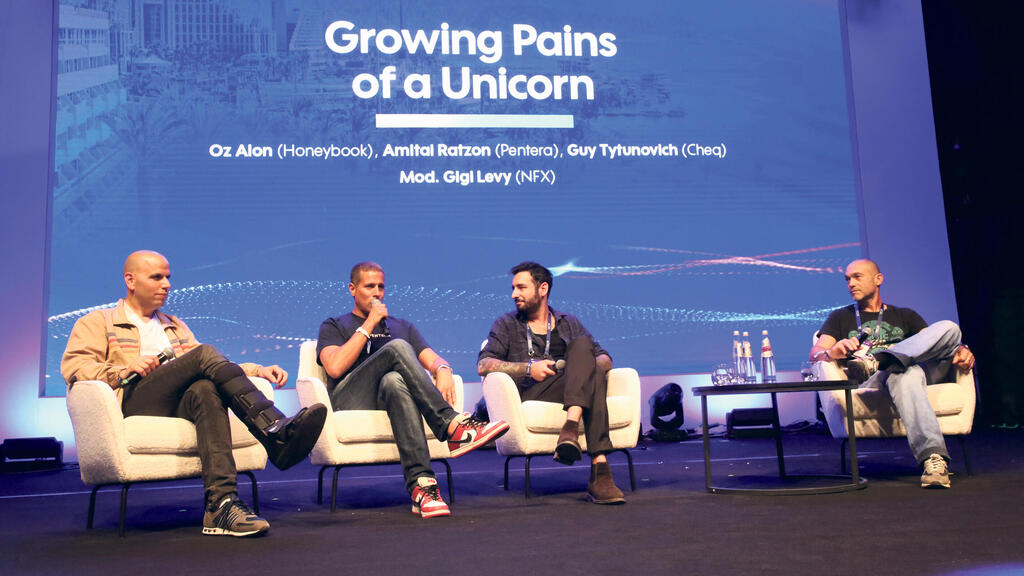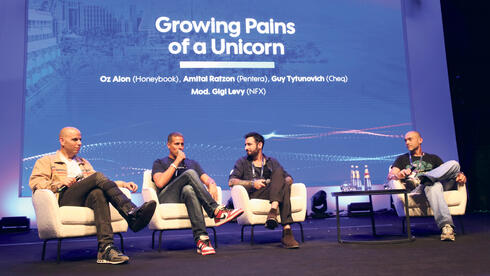
"If we play our cards right as a country, the AI revolution can create more jobs in Israel than ever before"
Oz Alon, CEO of HoneyBook, was speaking on a panel alongside Amitai Ratzon, CEO of Pentera, Guy Tytunovich, CEO of CHEQ, and Gigi Levy Weiss, general partner at NFX.
"The biggest challenge in the growth process of an Israeli company is how to integrate people from abroad, those who didn’t grow up here, and help them naturally experience what we go through," said Amitai Ratzon, CEO of Pentera, during a panel on the challenges of scaling to unicorn status at the Tech1 conference in Eilat. "The CEO’s job is to connect people from around the world and build a unified company culture. This is a new culture that emerges when you go global."
Gigi Levy-Weiss, general partner at NFX and moderator of the panel, asked the participants how the transition from startup to unicorn had affected them.
According to Guy Tytunovich, co-founder and CEO of CHEQ, the early stages are the most difficult, so much so that they took a toll on his health. In contrast, he said the later stages are more enjoyable: "There are guidebooks and defined processes for managing large companies. It’s more structured, and that makes it fun."
Oz Alon, CEO of HoneyBook, emphasized that despite the company’s growth, its connection to customers has remained unchanged. Involving employees, including engineers, in customer interactions helps maintain alignment with the company’s mission and keeps them grounded in its core values. The main challenge today, he iddle managers who grew within the company: “They’re loyal, deeply knowledgeable, and often the smartest and most motivated people to whom you can delegate authority.”
Levy-Weiss closed the discussion with a question about the impact of the AI revolution: Will companies employ more or fewer workers three years from now as a result of AI?
Tytunovich responded that CHEQ is in a unique position where AI significantly benefits the business. Still, he believes companies must proactively consider the social responsibility implications of AI and its effect on specific job roles. He expects headcount to grow.
Ratzon also views AI as a positive force, especially given the increased investment in their space, automating the attacker's perspective using AI.
Alon shared that AI has made him feel like he’s back in the “garage stage,” reinventing everything from scratch. His primary focus is on how AI benefits customers, particularly by empowering small businesses to scale. He too anticipates hiring more people in the future. “If we play our cards right as a country, across education, government, and industry, the AI revolution can create more jobs in Israel than ever before,” he concluded.
said, is maintaining culture and cohesion between the Israeli team (180 employees) and the U.S. team (100 employees in San Francisco).Ratzon described how customer relationships have evolved: from feeling like part of a close-knit “family” to becoming more abstract. The greatest challenge, he said, is integrating teams abroad who lack a shared cultural background. He likened the CEO’s role to that of a “grandmother” connecting different branches of a global family to create a new “Pentera culture.”
Related articles:
He stressed that AI does not solve cultural challenges: "You can't force 'fun.' You have to build authenticity, strong values, and a resilient culture, especially during tough times. Transparency and empathetic communication are key."
Tytunovich added that growth necessitates a cultural shift, requiring clear and concise communication due to internal diversity. In his view, transparency and working with “amazing and smart” people creates a sense of enjoyment. “The manager’s role is to be a great recruiter and HR leader,” he said. “You can’t compromise on talent.”
In response to a question about how the CEO’s role changes as a company grows, Alon recalled his early days, when he personally oversaw every transaction and even handled manual money transfers. Now, he said, his focus has shifted toward mentoring product managers and building scalable processes. He continues to meet with every employee at least once a year.
Ratzon acknowledged the difficulty of letting go of early-stage control: “We’re a bit of control freaks,” he admitted. Today, he maintains influence by cultivating leadership beyond senior management, ensuring he remains connected to insights from across the company. Tytunovich said he came to realize he wasn’t the smartest person in every area, and that the key is to surround yourself with people who are better than you in specific domains. His best “trick” is building a strong layer of middle managers who grew within the company: “They’re loyal, deeply knowledgeable, and often the smartest and most motivated people to whom you can delegate authority.”
Levy-Weiss closed the discussion with a question about the impact of the AI revolution: Will companies employ more or fewer workers three years from now as a result of AI?
Tytunovich responded that CHEQ is in a unique position where AI significantly benefits the business. Still, he believes companies must proactively consider the social responsibility implications of AI and its effect on specific job roles. He expects headcount to grow.
Ratzon also views AI as a positive force, especially given the increased investment in their space, automating the attacker's perspective using AI.
Alon shared that AI has made him feel like he’s back in the “garage stage,” reinventing everything from scratch. His primary focus is on how AI benefits customers, particularly by empowering small businesses to scale. He too anticipates hiring more people in the future. “If we play our cards right as a country, across education, government, and industry, the AI revolution can create more jobs in Israel than ever before,” he concluded.
